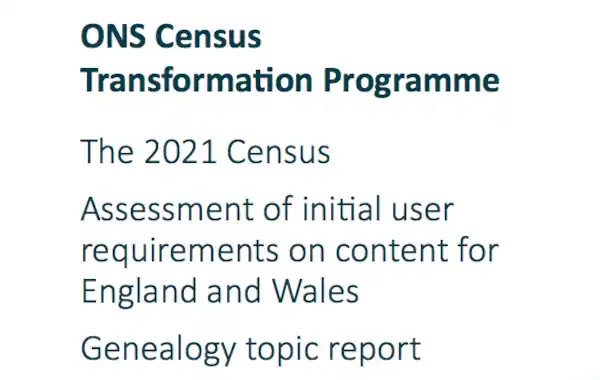27 May 2016
|
An official report into topics to be included in the 2021 Census for England and Wales has rejected key questions requested by more than 600 genealogists
Family historians are dismayed that an official report into topics to be included in the 2021 Census for England and Wales has rejected key questions requested by more than 600 genealogists.
The Office for National Statistics (ONS) launched a public consultation in June-August 2015 asking census users for their views on topics that the 2021 Census questionnaire might cover. On 23 May the ONS published its initial findings, reporting it had received 1,095 responses, with 606 groups and individuals discussing ‘Genealogy’ data. These included various family history societies along with the Federation of Family History Societies (FFHS), the Society of Genealogists, the College of Arms and individual genealogists. The report reveals that genealogists requested two sub-topics be included in the next census: ‘place of birth’ and ‘maiden names’. However, after a weighing up of the appeals and evidence, including a scoring system to rate the proposed topics, the ONS has decided that genealogy data collection had ‘low user need’, adding in the case of birthplace data: ‘The purpose of collecting this information is to be used at the individual record level, when released in 100 years’ time, rather than to understand or serve the whole population of England and Wales.’
Peter Calver, who runs the popular Lost Cousins website, says it was ‘predictable’ the plea for birthplace data would be rejected. Speaking in his newsletter (http://lostcousins.com/newsletters2/may16xtra.htm#Census2021), he adds, ‘but the manner in which they did it showed utter contempt for this country’s heritage – and for all of us who care about the legacy we will be leaving for future generations… Why deprive our English and Welsh descendants of this vital information?’
He argues the ‘scorecard’ ONS used to rate genealogists’ proposed additions to the census questionnaire was done ‘in such a way that our request would inevitably get a poor score… we got 0 points out of 10 because the birthplace question wasn't asked in the 2011 Census, even though it's because the question hasn't been asked since 1951 that it's so important to include it in 2021! Remember, the 2021 Census could well be the last conventional census – but even if it isn't, there are many people born after 1951 who simply won't be around in 2031.’
The ONS report refers to coverage of the census consultation that appeared on Lost Cousins last summer, stating ‘there were a large number of requests for place of birth and almost all of which were received on or after 24 August 2015 following the publication of a newsletter on the family history website “Lost Cousins”… The inclusion of place of birth is requested by genealogists to enable them to more easily identify the correct family member’.
Mr Calver claims the ONS ‘tried to minimise the contribution of genealogists’ by suggesting his readers were ‘simply doing what I told you in my newsletter’, adding: ’It's true that in my newsletter I did my best to guide you through a complicated document which was largely irrelevant to non-statisticians but, as you may recall, I ended by saying that "It's very important that the views expressed, and the wording you use, are your own”.'
The ONS received approximately 30 requests ‘to include maiden and/or former names for the purpose of identifying the correct family member more easily’. These included an appeal from the FFHS, which wrote: ‘The information requested is essential to positively identify individuals with relatively common names and so enable future generations (after the 100 year “closed” period has elapsed) to explore their origins and heritage. If such details are not collected by the census, it would often be difficult to make a connection between an appearance in the census and in other records.’
Smaller numbers of genealogists also made requests ‘for inclusion of new sub-topics such as full name, details of marriages (for example, date, place and number of marriages), details of all children born, and names of parents and their dates of birth. There were also three requests for a free text box or a similar concept to collect additional biographical or genealogical information’.
However, the report states that ‘none of these needs had sufficient evidence against the full range of evaluation criteria to allow an assessment to be undertaken’.
Family Tree readers have expressed dismay over the decision not to include questions that would help genealogists of the future.
On Family Tree’s Facebook page (facebook.com/familytreemaguk), Deborah Hart Stock posted: ‘Well that's disappointing – the ONS report on the 2021 Census topic consultation is published today, and although they examined the requests of genealogists for the inclusion of birth-place and maiden name, it seems that these have been put in the "too difficult and not enough demand" pile, and they won’t be included.’
Mike Gould commented: ‘In essence, it says they plan to collect no information that has been requested by genealogists. What a shame!’
While Derek Thom said: ‘They are NOT planning to record Place of Birth… I told them they have dropped a clanger.’
The ONS report into the ‘Genealogy’ topic concludes: ‘Although ONS will not be collecting this information in the 2021 Census, its value to the family history community is acknowledged. ONS will continue to engage with genealogists and family historians about the promotion of the 2021 Census.’
Results of the consultation will now help towards the development of a test census questionnaire to be sent out to a number of local authorities in 2017, which will then inform a Census White Paper in 2018. A final decision on questions in the next census will be presented to Parliament for approval in 2019. You can find out more and download each topic-specific report (look for ‘Genealogy’) at bit.ly/245xR8P.







